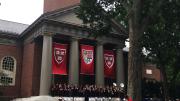“It was on this annual occasion of welcoming the incoming College class,” University president Drew Faust said at yesterday afternoon’s Freshman Convocation ceremony, “that a former dean of the Faculty of Arts and Sciences, the late Jeremy Knowles, described what he saw as the most important goal of higher education. It was, he said, to ensure that graduates can recognize when someone is talking rot.”
That was a line that she’s repeated at past convocations; this one was Faust’s last before she steps down from the presidency next summer. First-years looked up nervously (would it rain?) throughout the uncharacteristically cold and gloomy afternoon. Faust’s remarks, as with her last few convocation addresses, reflected the political uncertainty that new classes of freshmen increasingly find themselves in: “In recent weeks we’ve seen threats of global nuclear war, frightening examples of extreme weather, devastating acts of terrorism...and chilling instances of hatred, racism, anti-Semitism, and violence at an American college town not so different from this one,” she said. “What should a university education be at such a moment?”
She answered that question, in part, by restating the value to Harvard’s broader mission as a university—knowledge formation—of the University’s commitments to diversity:
It’s possible, in 2017, to accumulate enough information and pass enough tests through online learning to get a college degree. But we have asked all of you to uproot your lives, move to Massachusetts with carloads filled with paraphernalia and teary-eyed families forced to bid you goodbye. Why do we do this? We do it because we believe in the power of community as an essential educational force. But that community must be constituted so that it does not simply present you with what you already know...It is its diversity, its elements of unfamiliarity and difference that render Harvard College the extraordinary experience that I know you will find it to be.
Dean of Harvard College Rakesh Khurana, in his address at the ceremony, had noted that this year’s class “is the most diverse in Harvard’s history.” He meant in terms of race: as has been reported elsewhere, the class of 2021 represents the first Harvard class in which fewer than half the first-years are white. On that same thread, Faust continued: “Let me briefly address two current issues that grew out of the principles I just articulated. In the year ahead, you’re going to hear a great deal about the commitment to diversity…because it’s being directly challenged in what has already become a highly publicized lawsuit”—a reference to the suit alleging that the College discriminates against Asian Americans in admissions. “At issue is the very admissions process that resulted in your selection…We will continue to fervently defend our admissions processes and the importance of diversity as essential to our educational philosophy and as a critical opportunity for students to reach beyond the familiar.”
And of the College’s new policy sanctioning single-gender social organizations, set to take effect this semester, she said: “This new policy is motivated by the same commitment to providing an educational experience that affirms the importance of every student at Harvard, and urges students to learn from classmates unlike themselves….Those purposes animate the living-learning environment of the House system, which, come March, will randomly sort all of you into three-year living-learning communities. Those purposes,” she added, to loud applause, “also make clear that the powerful and expanding influence of discriminatory, exclusionary, overwhelmingly homogenous organizations is antithetical to our values and educational goals.”
The afternoon’s program also included a prayer by Plummer professor of Christian morals and Pusey minister in the Memorial Church Jonathan Walton, and remarks from Marcus Granderson ’18, president of the Kuumba Singers, and Michael D. Smith, dean of the Faculty of Arts and Sciences.
The speakers converged on a common theme: the overwhelming pressures of attending Harvard, and the related danger of comparing one’s experiences to those of peers. “As I read about your background and accomplishments, I’ve been reminded again about why I didn’t get into Harvard College,” Khurana joked. “It’s easier to become dean of Harvard College than it is to get in.” He continued, as he has in years past, to urge students not to rely on the devotion to excellence that brought them to Harvard in the first place. “You may feel expected to do high school all over again—to jump through a series of hoops and prove yourself…One of the most important things that I want to tell you is that you don’t,” he said. “Your four years here can either be transactional, or they can be transformational.”









